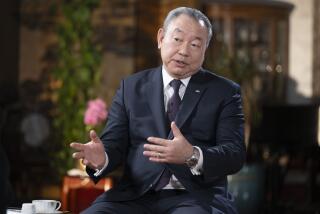Two Chinas: a Door Ajar
Officially there has been no change in Taiwanâs attitude toward political relations with China, its giant rival across the Taiwan Strait. The governmentâs longstanding position is that there will be âno contact, no negotiation, no compromiseâ with the Communist regime in Beijing, which for nearly a decade has been wooing the Nationalists on Taiwan to return to the embrace of the motherland. But unofficially, as more than a billion Chinese on both sides of the strait know, there is more contact between the people of the two Chinas now than at any time since their civil war ended in 1949--and more is in store.
The Nationalist Party recently opened Taiwanâs door to some mainland Chinese visitors and gave Taiwan businessmen permission to proceed with indirect investment and trade with China--overtures that once would have been unthinkable. The new policy should be a boon to Beijing, which needs just the kind of high-technology equipment and expertise that Taiwan can provide, at a friendly price. It should also please the Taiwanese businessmen who have lobbied for years for the right to compete for a slice of the mainland pie. Now many Taiwan firms will do openly what some have been doing clandestinely for years--conduct business with China through intermediaries and subsidiaries in Hong Kong and Tokyo.
Giving Taiwan a stake in Chinaâs modernization also has great political significance, despite the disclaimers from Taipei. Their increased contacts, initiated by Beijing on New Yearâs Eve, 1978, and boosted by Chiang Ching-kuo, Taiwanâs late president, have markedly eased tensions; both Taiwan and China have enemies--but not each other. Citizens of China and Taiwan now attend the same international conferences, study side by side in American universities and compete at the Olympic Games. Since Chiang agreed last fall that island residents could visit their mainland relatives, more than 100,000 have made the trip, and now some Chinese--mostly entertainers, journalists and intellectuals--will be welcomed on Taiwan.
Taiwan continues to spurn government-to-government contacts because it considers Chinaâs formula for reunification unacceptable: The island would be required to recognize the mainlandâs sovereignty but could retain its capitalist economy. Taiwanâs new president, Lee Teng-hui, the first native Taiwanese in that position, seems to have another model for reunification in mind--converting the Communists to capitalism, showing them the advantages of free enterprise.
Like all missionaries who have tried to change China, Taiwan may fail. But its efforts are bound to have some influence as China wrestles with the questions that modernization raises--whether there can be economic reforms without fundamental political change, whether an authoritarian party can run a decentralized economy, whether an ancient culture can import Western technology without becoming Westernized. Taiwan has traveled that same road and may have the answers that are most congenial to the mainland.
More to Read
Sign up for Essential California
The most important California stories and recommendations in your inbox every morning.
You may occasionally receive promotional content from the Los Angeles Times.










